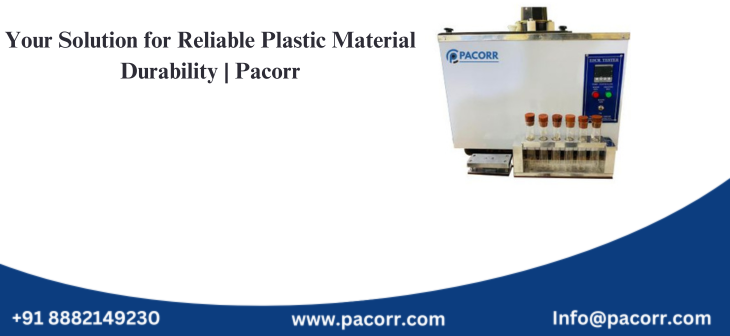
Plastics and polymers play a crucial role in modern manufacturing, but they are often exposed to harsh environments, which can lead to early failure. One of the key challenges that materials face is Environmental Stress Cracking (ESC), a condition where materials crack due to exposure to specific environmental conditions. At Pacorr Testing Instruments Pvt Ltd, we provide cutting-edge solutions to combat this issue, and one of our most significant products is the Environmental Stress Cracking Resistance (ESCR) Tester.
In this blog, we'll explore how ESCR testing works, its importance across industries, and how Pacorr's ESCR Tester helps manufacturers ensure the longevity of their materials.
What is Environmental Stress Cracking (ESC)?
Environmental Stress Cracking occurs when plastics are subjected to environmental factors like chemicals, stress, or temperature variations. Over time, these stressors cause microscopic cracks to form, weakening the material. While initially small, these cracks can grow and eventually cause the material to fail. ESC is a common issue in industries where plastics are exposed to chemicals or mechanical stress.
This makes ESCR testing essential in predicting a material’s lifespan and its ability to endure real-world conditions.
How Does Pacorr’s ESCR Tester Work?
The ESCR Tester from Pacorr is designed to replicate the conditions that materials face in their operational environments. By applying mechanical stress and exposing the material to specific environmental factors, the tester determines how resistant a sample is to cracking.
Here’s a quick overview of the testing process:
- Sample Preparation: The material samples are prepared and conditioned to ensure consistent testing.
- Environmental Exposure: The samples are subjected to varying stress levels, temperature changes, and chemical exposures.
- Observation and Measurement: The tester monitors and records how the samples respond, particularly looking for the development of cracks or deformations.
Why is ESCR Testing Important?
Environmental Stress Cracking can lead to significant product failures if left unchecked, especially in industries where materials are constantly exposed to fluctuating conditions. Here’s how ESCR testing benefits various industries:
1. Packaging Industry:
Plastic packaging, especially in the food, pharmaceutical, and chemical sectors, must withstand interaction with its contents and environmental conditions without compromising its integrity. ESCR testing ensures that plastic containers, bottles, and films do not crack prematurely, ensuring safe storage and transportation.
2. Automotive Industry:
Automotive parts made from plastics need to endure constant mechanical stress, temperature variations, and exposure to chemicals like fuels and oils. Failure of these components due to environmental stress cracking could lead to safety concerns. ESCR testing ensures that automotive parts can withstand real-world conditions.
3. Consumer Goods:
Many everyday items made from plastic, such as outdoor furniture, electronic casings, and household products, are exposed to environmental conditions that can cause cracking. ESCR testing is vital to ensure the durability and reliability of these products, maintaining customer trust and satisfaction.
Key Features of Pacorr’s ESCR Tester
Multiple Testing Configurations: Offers flexibility in testing under various environmental conditions, including different stress levels, temperatures, and chemical exposures.
- Precision Control: Provides accurate control over environmental factors to simulate real-world conditions, ensuring the test results are reliable and repeatable.
- Comprehensive Reporting: The ESCR Tester generates detailed data reports that help manufacturers understand material performance and make informed decisions.
Benefits of ESCR Testing with Pacorr’s ESCR Tester
- Improved Material Performance: Testing with Pacorr’s ESCR Tester allows manufacturers to identify weaknesses in materials early, enabling them to improve the product’s durability.
- Cost Savings: Preventing product failure due to environmental stress cracking can help avoid costly product recalls or replacements.
- Compliance with Industry Standards: Many industries, including automotive and packaging, require materials to meet specific ESCR resistance standards. The ESCR Tester ensures compliance with these regulations.
- Data-Driven Quality Control: The detailed reports generated by the tester allow for thorough analysis, ensuring manufacturers have data-driven insights into material quality.
How to Conduct ESCR Testing
The ESCR Tester is user-friendly and designed for precision. Here’s how a typical ESCR test is conducted:
- Sample Setup: Prepare the material samples according to industry standards or specific test requirements.
- Parameter Configuration: Set the desired stress levels, temperature, and environmental conditions on the tester.
- Testing: Initiate the test, during which the material is exposed to the defined stress and environmental factors.
- Data Collection: After the test, analyze the data to determine the material's performance and whether it meets industry or customer requirements.
Final Thoughts
Environmental Stress Cracking is a hidden threat to the durability of many products, but with the right testing procedures, manufacturers can stay ahead of potential failures. Pacorr Testing Instruments Pvt Ltd offers a reliable, high-performance solution with our ESCR Tester, enabling industries to ensure the resilience and longevity of their plastic products.
By incorporating ESCR testing into their quality assurance processes, manufacturers can prevent material failures, improve product durability, and maintain compliance with industry standards—all while gaining a competitive edge in the market.
What People Say
Thanks to Pacorr Testing instruments, we have all the required quality testing instruments that have helped us to ensure the best quality delivered to our clients.

Danish
Fair Exports Pvt. Ltd.

